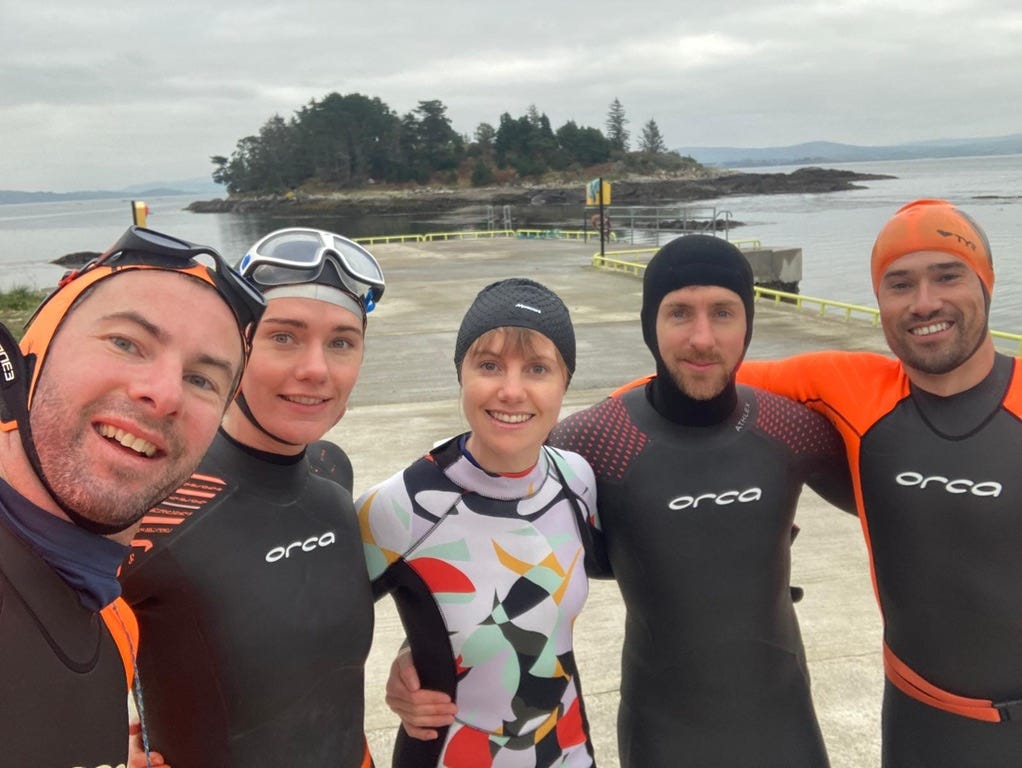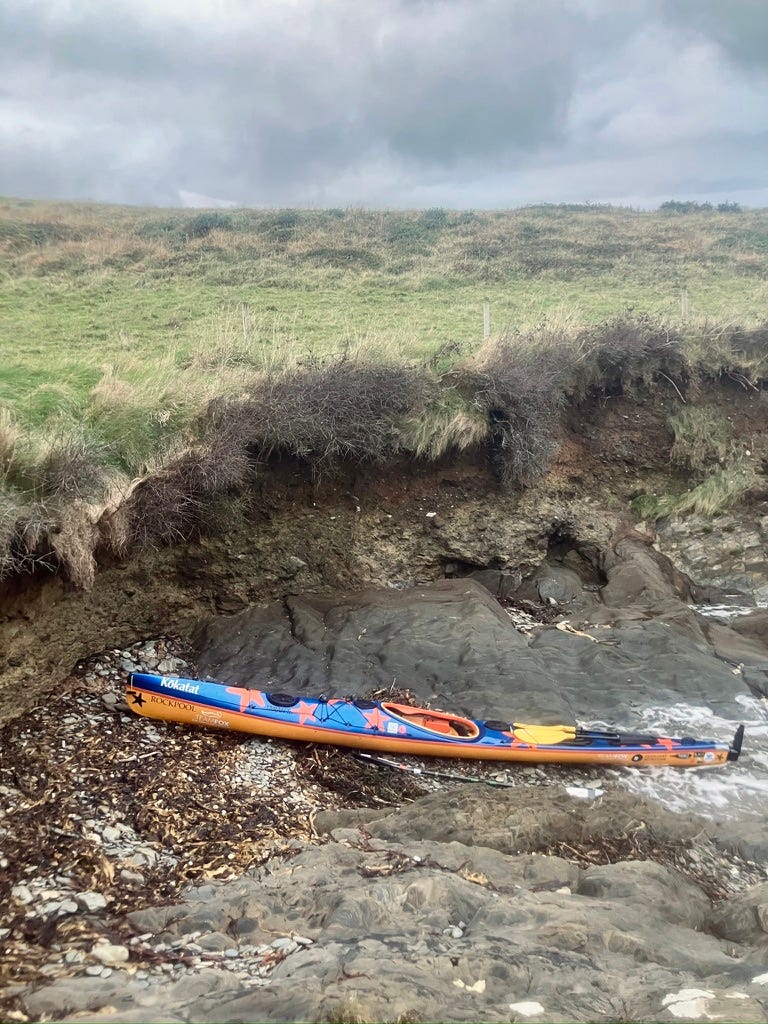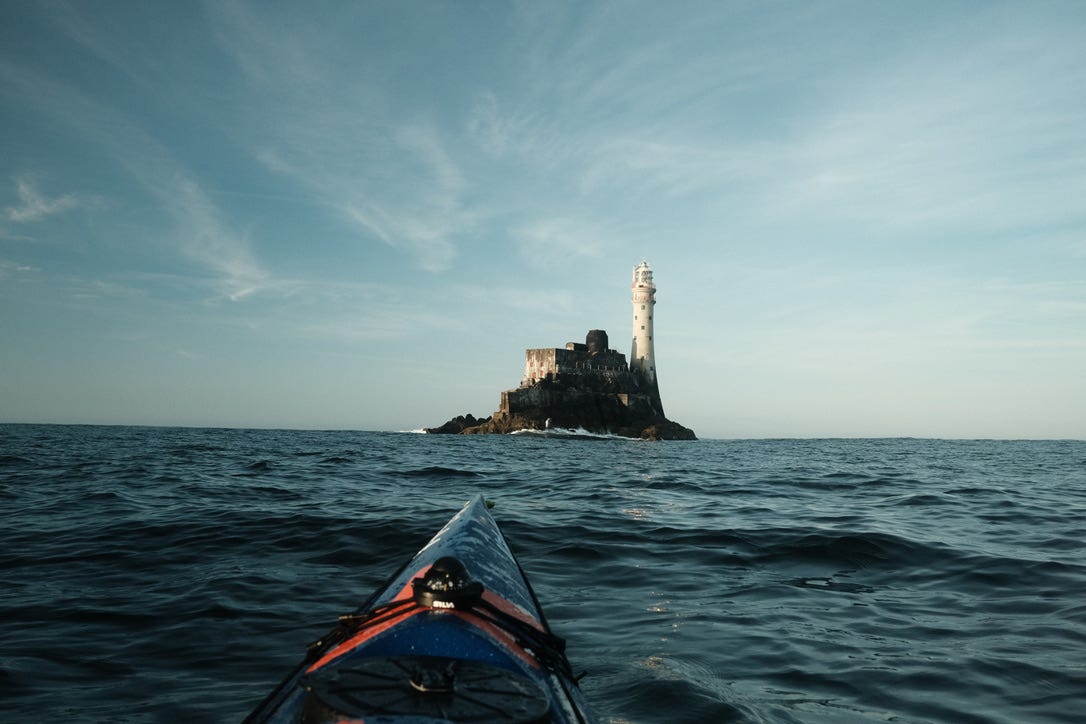24 things sea kayaking taught me about life in 2024
Trying to impress your mentor robs you of the learning opportunities that come from admitting what you don’t know.
Here are a few life lessons I picked up on the water in 2024. I’ll be writing more about some of these in the new year.
Forget about your goals (and you might actually achieve them)
If you hyper-focus on your goal and you miss the mark, you have nothing. If you forget about your goal and focus on the process, you’ll develop mastery and, paradoxically, be more likely to achieve your goal.
I learned this the hard way on my first around Ireland attempt and in the months of recovery that followed.
(H/T Zen Buddhism)Swim!
Two legendary ‘round Ireland kayakers I asked for advice told me the same thing: sea swimming was the best training for their trip.
This year, I got serious about swimming in the ocean year-round. Fitness-wise, an hour of swimming is like a day in the boat. Cold, dark water is a good place to train intangibles like grit and confidence.(H/T Jon & Jeff)
Find swim buddies
Swimming alone isn’t just unsafe, it’s scary and a lot less fun. Lately, I’ve been getting together with a few swim buddies to circumnavigate little islands and offshore rocks near where we live and warm up with coffee after.Have different “gears”
Know when to take it easy and conserve energy and when to flip a switch and paddle like fuck. If you only have one speed, you won’t go far.
Toughness is more important than fitness
“Toughness” doesn’t mean trying to be Rambo (According to Deep Survival, “the Rambo-types are the first to go”). It just means taking one more step when you’re exhausted.
That skill, which is mostly mental, can be trained and is much more important than your VO2 max or how much you can bench.(H/T Ross Edgely)
Breakfast in the boat
Preparing breakfast is a colossal waste of what’s usually the calmest part of the day. All you need is coffee (in a flask, brewed the night before) and a fistful of trail mix to get going. Have “Second breakfast” after you put in some sea miles. (I’m writing this before dawn on an empty stomach).Your PFD/BA/lifejacket doesn’t have to be bulky
Kokatat recently sent me one of their low-profile whitewater PFDs, and it’s such an improvement over the one I was wearing. I need floatation occasionally (and it provides that), but I need range of motion in my shoulders all the time.
You’re only as good as your attention to detail
As soon as you leave dry land, you enter an environment where the smallest details can have tremendous consequences. Get in the habit of checking zippers and hatch covers like your life depends on it—because it does.
A friend of mine who was in the Marine Corps said that he once left the cap off a tube of toothpaste in Boot Camp and was told this lapse in attention, “Got a lot of good men killed.” Dramatic, but a good way to think about gear checks.You don’t need all that gear…
Another paradox is that buying more gear helps you realize what you need and what you don’t.
It’s easier (but more expensive) to start with too much kit and remove things you don’t need than to start with a minimalist setup and find out you’re missing something important. When in doubt, ask more experienced paddlers what they carry.Always be training
Big adventures are supposed to be all-consuming. When I’m at my desk, I’m training to sit in the boat all day. I do yard work and run errands in fewer layers to improve my cold tolerance.
That immoderate attitude will pay off when I’m shivering on a storm beach or upside-down trying to roll up.
The motto of the FDNY Fire Academy is “Let no man’s ghost come back to say ‘my training let me down.’”(H/T Rick Rescorla running barefoot).
Rest = training
Seriously, get some sleep.
Lower your voice (and know when to raise it)
A guide friend who’s been teaching me group management skills suggests speaking softly and not giving too many directions when leading on the water. People go kayaking to have fun and enjoy the outdoors, not to be yelled at or given orders.
If your intensity is already a 10/10, you have nowhere to go. And that’s a problem if there is an incident, and you do have to be more direct and raise your voice. Just like your paddling “gears,” it’s all about having range and adapting to match the conditions.
(H/T David W.)Am I having fun?
When in doubt, follow the fun.
Pick your type-2 fun
You’ll have more fun putting up with the right kind of “type 2” fun than by trying to have Mickey Mouse “type 1” fun in the sun all the time.Adrenaline/ intensity addiction is something to keep an eye on
In Apocolypse Now, Martin Sheen’s character voices a common frustration felt by adventures:
”When I was here, I wanted to be there. When I was there, all I could think about was getting back to the jungle.”
Everyone is going to find a different balance between home life and whatever their “jungle” is. From a safety point of view, I think the time to come in from the cold is when you become so fear-adapted that you stop paying attention to your surroundings and ignore signs of danger because you’re too comfortable.Peak experiences can make everyday life seem tedious
A real downside of having adventures and seeking intensity is that it can make everyday life seem kind of blah by comparison. Post-trip blues are a thing, even after a day trip.
This seems to be especially true if, like me, you already deal with ADHD and/or depression. The issue isn’t the outdoors, it’s coming home. Time spent outside is still always net positive for your mental health, but the comedown is something to be aware of.Healthy stress is still stress
One of the challenges of balancing a heavy training load with work and family responsibilities is that the healthy stress of training still contributes to your overall stress, or what physiologists call your allostatic load.
Sometimes rest means training light. Other times, it means doing nothing. “The body keeps the score.”(H/T Dave F).
“Life is too short to waste time on second-class ambitions. Go for the big ones, even if that means a high failure rate.”
— Ranulph Fiennes, Climb your MountainBehind every training scenario is a real-life tragedy or near-miss
I was recently on a safety course where we were drilling an extremely technical rescue with lots of moving parts. One of my fellow students asked,
“But how likely is this, really?”
To which our instructor replied, “Well, it happend in a group I was guiding.”Your 30s are the time to invest in your own longevity
If you’re dreading getting older, you’re doing it wrong. The best athletes I know (on and off the water) are in their 50s and 60s. The older you get, the more intentional you have to be about diet, training, etc.
(H/T Mark C. & Steve P.)Training is about creating a “safe space” for failure and discomfort
One of the best things about working with a coach or paddling in a group is having the opportunity to push your limits under supervision. This is a good time to mess up, bounce off rocks, and ask stupid questions.I’ve learned the hard way that trying to impress your mentor robs you of the learning opportunities that come from admitting what you don’t know.
“Big sick vs little sick”
Arguably, the most important skill in first aid is learning to distinguish between “big sick” and “little sick”——stuff that requires first aid support while you wait for more advanced medical care vs. patch-up jobs that only require a first aid kit and some knowledge.
You can apply this to many of life’s problems.“Assessment-itis”
On courses and assessments, there’s a tendency to default the most recent thing you’ve learned and force it to fit the scenario like trying to do CPR on someone with a sprained ankle because you just learned CPR.
Learn to size up every situation on its own and apply the full range of your experience accordingly.
Observe before you act.Watch out for “grey rhinos”
Risk expert Michelle Wucker coined the term “grey rhinos” in her book of the same name. A grey rhino is an obvious, well-known risk for which there is no excuse not to prepare.
In sea kayaking, cold exposure is the grey rhino.
Essentials of Sea Survival devotes about half its length to cold and the other half to every other danger at sea. The lesson, just from reading the table of contents: be less worried about sharks, and more worried about layers.
Happy New Year and thanks for reading,
P.S. When I’m not having adventures, I’m helping other people write about theirs. If you or someone in your circle has an amazing story to tell, I'd love to hear it. I have some availability for new ghostwriting and editing projects.
— Charlie
Kokatat is the official gear sponsor of The Lap.
The lap will be fueled by Resilient Nutrition’s Long Range Fuel and bars.
Expedition coffee by 3fe.
CH Marine will be providing a VHF radio and other safety equipment.
Camp kit and cooking gas provided by Paddle & Pitch. Trolley by KCS.
REAL Field Meals at a discount from Adventure.ie.














1. We are overdue for a catchup.
2. So many nuggets of wisdom in here, but especially loving the ones on forgetting about your goals and paying attention to the little details.
Wow, that was hard hitting, lol. Could see so much of myself in your thoughts. We're all on a very similar storyline - well done for recognising it ❤️